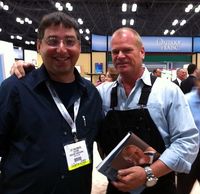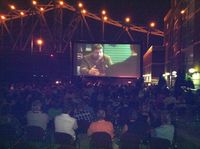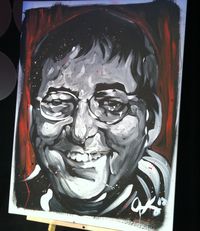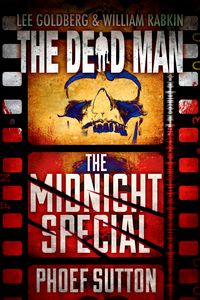Bumsicle Trailer
Here’s the very short trailer for BUMSICLE, the short film I wrote and directed earlier this year in Kentucky and that is now playing the Festival circuit…
Scribe Award Winners Announced
Bestselling author Kevin J. Anderson was honored as this year’s Grandmaster at the International Association of Media Tie-In Writer’s annual Scribe Awards ceremony, held Friday night at Comic-Con in San Diego.
Anderson was honored for remarkable achievements in the tie-in field, which include more than one hundred novels, adding up to over 20 million books in print in thirty languages. His work includes the Star Wars "Jedi Academy" books, three internationally bestselling X-Files novels, the Superman novels The Last Days of Krypton and Enemies & Allies, many novelizations (Sky Captain & The World of Tomorrow, League of Extraordinary Gentlemen, etc.) and, of course, the ten globally bestselling DUNE novels he has co-authored with Brian Herbert.
Receiving the honor was, for Anderson, “like receiving a standing ovation for something that was already fun in the first place, and I am very honored to be recognized by my colleagues in this particularly challenging line of writing."
He wasn’t alone accepting honors on Friday. The Scribe Awards, recognizing excellence in the field of media tie-in writing for Best Original Novel in Speculative and General Fiction genres, Best Adaptation, Best Young Adult novels and Best Audio performance, were also awarded at the event, which included a lively panel discussion with the winners and nominees.
Cowboys & Aliens by Joan D. Vinge was the winner for Best Adaptation, Dungeons & Dragons – Forgotten Realms: Brimstone Angels by Erin M. Evans took the prize for Best Speculative Original Novel, Mike Hammer: Kiss Her Goodbye by Max Allan Collins & Mickey Spillane won for Best Original Novel, and Thunderbirds: Extreme Hazard by Joan Marie Verba was honored for Best Young Adult Novel. Mike Hammer: Encore for Murder by Max Allan Collins & Mickey Spillane won the Best Audio award.
Collins was “blown away” by his double win this year, but was particularly pleased that “the work I've been doing to bring Mickey Spillane's unpublished, unfinished material to fruition has earned this kind of recognition."
The IAMTW (I Am a Tie-In Writer) is dedicated to enhancing the professional and public image of tie-in writers…to working with the media to review tie-in novels and publicize their authors…to educating people about who we are and what we do….and to providing a forum for tie-in writers to share information, support one another, and discuss issues relating to their field.
Busy Bee Lee
 Sorry I have been so absent around here lately… the last few weeks have been intensely busy for me. Here's a quick run-down…with pictures.
Sorry I have been so absent around here lately… the last few weeks have been intensely busy for me. Here's a quick run-down…with pictures. I turned in my 15th, and final, Monk book — MR. MONK GETS EVEN — to Penguin/Putnam on June 1st, then jetted off to Book Expo America in New York, where I got to hang out with my friends at Amazon Publishing and Brilliance Audio, talk shop with scores of authors (including fellow "Amazon" authors Blake Crouch, Vincent Zandri, Johnny Shaw, Robert Pobi, Deborah Reed, David Hewson, Robert Kroese, etc), and meet Audie-award nominees Patrick Lawlor (the voice behind my book KING CITY) and Luke Daniels (the voice behind the audio version of THE DEAD MAN, THE WALK). (That's me on the convention floor with Mike Holmes, a HGTV celeb that my wife adores)
From New York, I headed to Kentucky, to direct a DEAD MAN music video that I wrote for Amazon to go along with the terrific theme song written & performed by Matt Branham.
And now I'll digress… on the flight, I was stuck in an aisle seat right next to the toilet…so close, I could have peed into it from my chair.If that wasn't bad enough, a morbidly fat woman sat down next to me and couldn't fit into her seat…so she had to lift up her armrest to spill her blubber onto me. I found myself sitting at an angle, tilted towards the bathroom, which a guy promptly rushed into after take-off to have a gastrointestinal explosion of historic proportions. The fat woman quickly fell asleep…and proceeded to loudly fart her way ac ross the midwest. It was hell. I didn't know whether to put my earplugs in my nose or my ears. When we finally landed, she asked me how the flight was. I told her we lost two engines but she managed to keep us in the air. She had no idea what I was talking about, but at least I amused myself.
ross the midwest. It was hell. I didn't know whether to put my earplugs in my nose or my ears. When we finally landed, she asked me how the flight was. I told her we lost two engines but she managed to keep us in the air. She had no idea what I was talking about, but at least I amused myself.
Okay, back to the video. We shot in and around Tell City, Indiana, and at the Hawesville, Kentucky stage of Firelight Entertainment Group, the extremely talented and industrious folks I worked with on my short film Bumsicle. Our DEAD MAN cast included Silvio Wolf Busch and Misty Sisco and we had a blast. (That's Misty and Silvio in the center, between the two monsters. You can see a lot more pictures on the Firelight site and their Facebook page)
The day after wrapping the music video I had to jump into my duties as honorary co-chair of the International Mystery Writers Festival in Owensboro, where I played host to the legendary Firesign Theatre and authors (and now fellow Kentucky Colonels) Max Allan Collins, Barbara Collins, Robert Randisi, Christine Matthews and Libby Hellmann and moderated a panel on writing James Bond novels with Raymond Benson and Jeffrey Deaver.
 The highlight of the Festival was a night-time, out-door screening of my Owensboro-set short films Remaindered and Bumsicle, which drew over 500 people to Riverpark Center on the banks of the Ohio River. It was fantastic…and I am so glad that the cast and crew of those films, including actors Todd Reynolds, Rick Montgomery, and Eric Altheide, were able to be there to see the enthusiastic audience response. (That's Todd on screen)
The highlight of the Festival was a night-time, out-door screening of my Owensboro-set short films Remaindered and Bumsicle, which drew over 500 people to Riverpark Center on the banks of the Ohio River. It was fantastic…and I am so glad that the cast and crew of those films, including actors Todd Reynolds, Rick Montgomery, and Eric Altheide, were able to be there to see the enthusiastic audience response. (That's Todd on screen)
As if that wasn't a big enough thrill for me, at the annual Angie Awards ceremony that capped the Festival, my friends at Riverpark Center surprised me with a portrait by Aaron Kizer, the incredibly talented "speed artist." It was a wonderful gift and a great honor.
 And all of that was just the first three weeks of June.
And all of that was just the first three weeks of June.
July has been much slower… at least in terms of travels…since I've mostly been sitting at my desk, working on my book with Janet Evanovich, who flew into L.A. last week to be a guest on The Talk, which gave us a chance to get together for a wonderful dinner.
I'm also in the midst of editing THE DEAD MAN video with Firelight's Rachael Nunn (the footage looks great!) and reading entries in the "You Can Write a DEAD MAN Novel" contest, which ends on August 1st.
In other words, don't be surprised if I don't have a lot of time to contribute to the blog…
The Big Deal
No. 1 NYT bestselling author Janet Evanovich sold the next four novels in her blockbuster Stephanie Plum series, and with Lee Goldberg, four novels in a new series, featuring an FBI agent and an international fugitive, to Gina Centrello of Random House, and Libby McGuire of Ballantine Bantam Dell, by agent Peter Evanovich. This was a major, major, mega-major deal.
I am well into writing the book with Janet, who is an old friend of mine, and we're having a ridiculous amount of fun. It's so nice not to be writing a "whodunit" for a change and to be telling a big, thrilling, funny, romantic adventure story. That's one of the reasons I've been so absent around here lately. I've been totally into writing the book…
The Midnight Special
 Emmy-award winning writer Phoef Sutton's THE DEAD MAN #12: THE MIDNIGHT SPECIAL, his wickedly funny and scary addition to the series, is out today… and it's the perfect way to end our "first season" of short novels. It's also Phoef's first published novel since his acclaimed ALWAYS SIX O'CLOCK back in 1999…and a real departure from his previous work.
Emmy-award winning writer Phoef Sutton's THE DEAD MAN #12: THE MIDNIGHT SPECIAL, his wickedly funny and scary addition to the series, is out today… and it's the perfect way to end our "first season" of short novels. It's also Phoef's first published novel since his acclaimed ALWAYS SIX O'CLOCK back in 1999…and a real departure from his previous work.
So we asked him about the book…and his writing career.
You're a two-time, Emmy award winner for your work writing & producing CHEERS, and you've written for such shows as BOSTON LEGAL, NEWHART and TERRIERS. You're one of the few TV writers who has been able to move between comedy and drama. Why is that so uncommon and how have you been able to pull it off with such apparent ease?
It’s just that I approach them all in the same way. As stories about characters involved in compelling situations. When you think of it like that, the specific genre or style doesn’t become paramount. The character’s journey is what matters.
How did your first novel come about? What did you think about the experience?
Writing is my work and my hobby, I wrote my first novel in my spare time, just to see if I could do it.
Not only are you a TV writer and novelist, but you've also written several feature films, like THE FAN and MRS. WINTERBOURNE. What kind of writing are you most comfortable doing? Or is it just enough to be writing?
I like all of it. Doing different things helps keep me interested; that’s one of the reasons I keep branching out. But of the three, screenwriting is the least friendly to the writer. In TV, the writer can be the boss, at least if he’s the showrunner, up to a point. In the novels, of course, the writer is the boss of everybody. Because he makes everybody up!
What attracted you to THE DEAD MAN series?
I’ve always wanted to write horror. I’m huge fan of that genre. Richard Matheson was one of my boyhood idols. For whatever reason, I’ve never gone in that direction professionally, so when Lee Goldberg mentioned this series to me, I jumped at the chance. Of course, Lee was himself another attraction – we’ve been trying to work together for years and this is first time we’ve had the chance.
What did you get out of writing THE MIDNIGHT SPECIAL that you don't get from writing sitcoms, dramas, and movies? 
There is one obvious thing you get out of writing novels that sets them apart from other forms of writing – no network or studio notes. You’re writing this mostly the way you want to write it. The other thing I love about fiction is the way it’s so easy to get inside your characters heads. You want to let the reader know what he’s thinking? You just write it. No need to resort to voice-over or character foils or narrative tricks. I revel in that!
What sets your book apart from the others in the series?
Some say it’s the humor. I can’t help but find comedy – in even the most dire circumstances. Not that the book’s laugh riot, but there is humor between the lines. Let’s say the narrator of the book has a wry sense of macabre humor. I also liked the narrative trick they used in the first book of flashing forward in time and I tried to use that as well. I think the narrative voice of this book is closest in the series to the original.
What were some of the challenges you faced writing the book?
Action scenes. I’ve never really done them before. And writing them is a real bear. Try writing “he threw a punch” in seventeen different ways. But I’m learning!
What's next for you?
I’m finishing a new novel – a bit of hard-boiled action called CRUSH. And I’m producing a comedy for TVLand, THE SOUL MAN. That should keep me busy through the summer.
Outing Outskirts Press
The “Hollywood” package marketed by the vanity press Outskirts Press to naive, aspiring writers is such a blatantly outrageous and predatory rip-off that I am posting Victoria Strauss’ excellent Writer Beware blog post about the shameful scheme in full to make sure the word gets out to anyone foolish enough to be considering it (or the equally worthless one offered by Author Solutions) .
Self-publishing service Outskirts Press–home of some of the sillier “book marketing” services–is taking advantage of one of writers’ most fevered pipe dreams with its new Book Your Trip to Hollywood service. Of course, the press release doesn’t put it that way:
These services solve a real problem for many authors who dream of making it big in Hollywood. In fact, just getting Hollywood’s attention is nearly impossible, but with the Book Your Trip to Hollywood suite of services from Outskirts Press, authors receive turn-key, full-service assistance with the push of a button. And with each option, authors receive the feedback and/or participation of a real Hollywood producer and production company; the final results are added to a Hollywood database that is perused by industry professionals for new projects; and exclusive efforts to option the author’s book are immediately set into motion. The author doesn’t have to lift a finger.
Except to pull out his or her credit card.
The first of the “suite of services,” the Hollywood Book-to-Movie Treatment, costs a cool $3,299. For that, you get a 7-10 page “creative adaptation” of your book written by a screenwriter. Which screenwriter? What are his/her credits? Sorry, that info is not available.
You also get an evaluation and a 3-year optioning effort from a Hollywood production company. Which company? What films has it produced? What further compensation might be due if it does manage to get someone to option your treatment? Oh dear–Outskirts isn’t telling you that, either. (The disclaimer that authors have to sign in order to buy the service mentions a “partner production company” with the initials “VM”; that’s too little information even for Writer Beware’s sleuthing superpowers.)
The second service, the Complete Hollywood Screenplay, has a sticker price of $1,999. Hmmm, you might be thinking; why does an entire screenplay cost less than a 7-10 page treatment? Because the $1,999 is only a downpayment, you big silly! It puts you in touch with a screenwriter (once again, no info on identities or credits) to “discuss additional details”; if you want to proceed, you’ll owe an extra $9,940. (What happens if you don’t want to proceed? Can you get your downpayment back? No word on that from Outskirts.)
Since buying the treatment service is a pre-requisite to buying the screenplay service, the total bill for your Hollywood pipe dream comes to $15,239. Outskirts can even claim that this is a bargain: the very similar services offered by Author Solutions will set you back over $18,000.
It hurts my heart, and my brain, to think that authors might actually shell out this kind of money for services that would likely net them zero results even if performed by skilled professionals at reasonable prices. Selling a book to Hollywood is one of the most fervent writerly ambitions; it’s also one of the most unattainable. And as much as you may roll your eyes and think, “Surely no one would fall for a scheme like this,” the fact is that people do–or the schemes wouldn’t exist.
Lee here again…
Remember, Outskirts Press is not a publisher. They are a printer. They aren’t making dreams come true…they are taking advantage of the gullibility and desperation of aspiring writers. And they have ZERO credibility and influence with the studios and networks in Hollywood. Give your $15,000 to the first homeless person you see instead… not only would it be a better use of your money, you would also have exactly the same chance of making a movie sale as you would giving it to Outskirts.
The Mail I Get – Sell My Show Edition
I get a lot of emails from complete strangers with TV series they want me to help them sell. This one is typical:
I am coming into Los Angeles on a trip. If you are free this week, I would like to buy you lunch. I have created a TV series I think you would like. All the scripts are written so all you have to do is sell it.
Is that all? Here's another:
I enjoyed reading your Successful Television Writing book. I have read everything on the subject and yours is superior. I am a writer from Vermont, new to Hollywood, with a fully written TV series in my back pocket. Is there any chance I could buy you lunch some time? XYZ and XYZ are my mentors, if you need references.
If he read my book, then he'd know this is not the way to get your series sold. Not only were the two people he used as references not friends of mine, I'd never heard of either one of them. Turns out one of the guys is among the six credited writers on a Big Tentpole Superhero Movie, the other is a guy who wrote Saturday morning cartoons in the 70s. As mentors go, though, they aren't doing a great job. The first thing they should have told him is not to hit up complete strangers to help you sell your series…and certainly not a guy who hasn't succeeded in getting a series of his own on the air.
Here's another one, from a "an actor/writer who resides in the Bible belt of the USA":
For the past year I have been working on a series I want to pitch to network. I had an agent that was going to help me out. She asked a producer friend to read the short sizzle script. Producer said it was defiantly worth shopping around, next thing I knew that agent was closing her doors. She couldn’t handle the stress of the biz. Now after talking to a producer in LA that says it is worth shopping around as well. Told to expand it into an hour drama instead of the 30 min one, and get together a budget. […]I’m currently trying to find a more flexible job in the industry so I can pursue my acting/writing career and looking for a mentor to guide me. I look forward to hearing from you.
I have been in the TV business for over twenty years and I have no idea what a "short sizzle script" is. Maybe I need a mentor to guide me. And if she's already talked to "a producer in LA that says it is worth shopping around," why isn't she busy shopping the project with him instead of contacting strangers like me?


